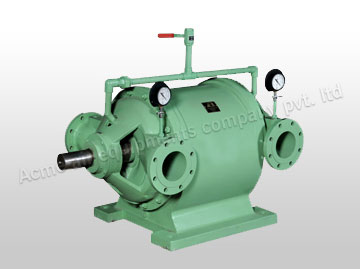Vacuum Pumps Products
Acme Air Equipments Vacuum Pumps
Acme Air Equipments is a renowned name in the manufacturing, export, and supply of high-quality vacuum pumps. With years of expertise in the industry, we have become one of the leading suppliers of various types of vacuum pumps such as Liquid Ring Vacuum Pumps, Two-Stage Liquid Ring Vacuum Pumps, Water Ring Vacuum Pumps, and Oil Sealed Vacuum Pumps. Our products are designed to offer outstanding performance, efficiency, and durability for a wide range of industrial applications. Whether you are looking for reliable pumps for process industries, pharmaceuticals, or other heavy-duty uses, our vacuum pumps are engineered to meet the highest standards.
- Liquid Ring Vacuum Pump
The Liquid Ring Vacuum Pump is ideal for industries requiring a reliable and efficient vacuum source. It operates on the principle of creating a liquid ring inside the pump, which provides the necessary seal for smooth operations. These pumps are used extensively in chemical, pharmaceutical, and food processing industries for removing air and gases from vessels and systems. Known for their ability to handle vapors, liquids, and gases, these pumps are designed for both high and low vacuum applications. - Two-Stage Liquid Ring Vacuum Pump
Designed for applications requiring a higher level of vacuum, the Two-Stage Liquid Ring Vacuum Pump provides better suction efficiency. It operates in two stages to deliver a deeper vacuum, making it suitable for applications that demand higher vacuum levels. With enhanced performance and reduced maintenance requirements, this pump is perfect for industries such as plastics manufacturing, paper processing, and more. - Water Ring Vacuum Pump
The Water Ring Vacuum Pump is specifically engineered to handle a wide range of gases and vapors, especially where water is the sealing medium. These pumps are perfect for wet environments and provide the necessary vacuum for various chemical processes. Their robust design ensures that the pump operates efficiently even under harsh conditions. - Oil Sealed Vacuum Pump
Oil Sealed Vacuum Pumps are ideal for handling dry gases in various industrial applications. The oil helps to create the vacuum seal, ensuring a smoother operation and longevity of the pump. These pumps are commonly used in industries that require a consistent, high-level vacuum, such as in laboratories, manufacturing, and research applications.
Key Features of Our Vacuum Pumps
- High Efficiency: Our vacuum pumps are designed to deliver optimal performance with low energy consumption.
- Durable Construction: Built with top-quality materials to ensure long-lasting durability and minimal wear and tear.
- Versatile Applications: Suitable for a wide range of industries including pharmaceuticals, food processing, chemicals, and more.
- Low Maintenance: Designed with ease of maintenance in mind, ensuring cost-effective long-term operation.
- Reliable Performance: Each pump is rigorously tested to ensure that it performs reliably under varying operating conditions.
Frequently Asked Questions - Vacuum Pumps
Vacuum Pumps are mechanical devices designed to remove gas molecules from a sealed chamber, creating a vacuum or low-pressure environment. They are used in various industries and applications where the presence of gas needs to be reduced or eliminated. Vacuum pumps play a crucial role in processes such as vacuum distillation, degassing, refrigeration, scientific research, and many more.
The different types of vacuum pumps include Liquid Ring Vacuum Pump, Two Stage Liquid Ring Vacuum Pump, Water Ring Vacuum Pump, and Oil Sealed Vacuum Pump. Each type has its own specific design and applications in various industries.
A Liquid Ring Vacuum Pump is a rotary machine where liquid, typically water, acts as a piston. It consists of a cylindrical rotor with curved blades that rotate within a larger cylindrical casing. The blades form a series of buckets, creating a vacuum by the action of the liquid ring.
A Two Stage Liquid Ring Vacuum Pump operates in series, with the discharge from the first stage being directed into the suction port of the second stage. The integral two-stage impellers condense process vapors and improve efficiency at higher vacuum levels compared to single-stage pumps.
A Water Ring Vacuum Pump is a type of liquid ring vacuum pump where water is used as the operating liquid. These pumps are primarily used as vacuum pumps but can also function as compressors for specific applications. They have a simple construction, trouble-free operation, and can handle moist air, aggressive gases, and dust-laden gases without contamination.
The advantages of an Oil Sealed Vacuum Pump include its reliable performance, high vacuum capability, and wide range of applications. It is commonly used in industries for processes requiring low pressure, such as in laboratories, manufacturing, and research facilities.




